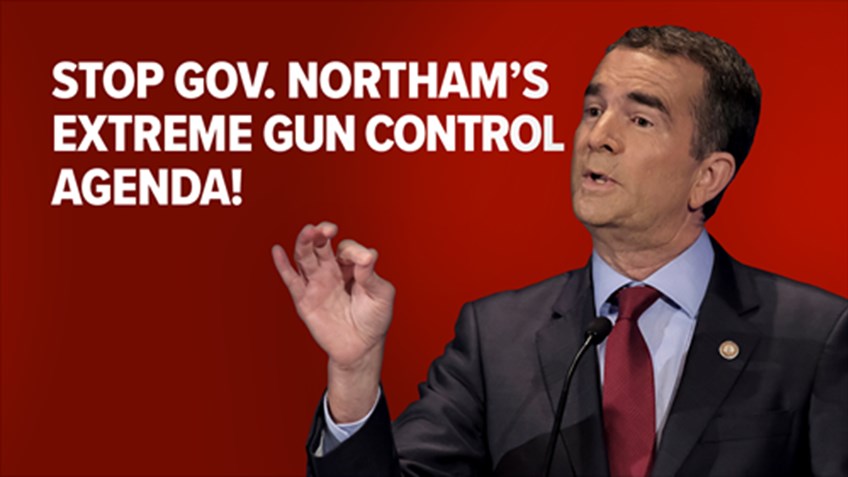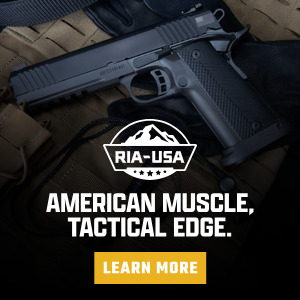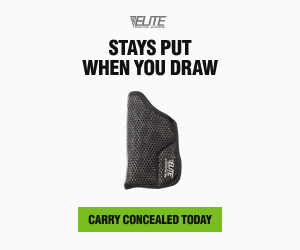Virginia Governor proposes harsh firearm legislation. READ MORE
SOURCE: NRA-ILA
Virginia Gov. Ralph Northam (D) must think that Old Dominion gun owners are stupid… After months of Northam and his Michael Bloomberg-backed General Assembly allies advocating for the enactment of gun confiscation legislation, the governor has told the Virginia Mercury that he will support a gun ban bill that would grandfather currently possessed firearms but require owners to register the newly-prohibited firearms with the government. As astute gun owners know, gun registration facilitates gun confiscation. Northam wants law-abiding gun owners to register their guns with the same people who have already stated that they want to confiscate them.
The evidence is clear: Virginia politicians want to confiscate your firearms.
On June 4, an embattled Gov. Northam announced a special session of the General Assembly in order to enact a raft of gun control legislation. During his remarks, the governor expressly said that “I will propose many of the same ideas that we have proposed before… A ban on assault weapons…”
On July 8, Del. Mark H. Levine (D-45) delivered for Northam and pre-filed gun ban bill HB 4021. The legislation garnered 23 cosponsors. That same day Sen. Adam P Ebbin (D-30) pre-filed the identical SB 4024, which attracted 16 co-sponsors.
The legislation would have banned the importation, manufacture, sale, transfer, and possession of what it termed “assault firearms.” The term was defined to include any semi-automatic centerfire rifle with a fixed magazine capacity in excess of 10 rounds or any semi-automatic centerfire rifle that has the ability to accept a detachable magazine and has one of several enumerated features. These features included, a folding or telescoping stock, a pistol grip, a thumbhole stock, a second handgrip, a bayonet mount, a silencer, a flash suppressor, a muzzle brake, a muzzle compensator, or a threaded barrel. The legislation also would have banned commonly-owned semi-automatic shotguns and centerfire pistols with any one of several prohibiting features.
As Levine and Ebbin’s legislation prohibited possession of these firearms, the bills, which were drafted at Northam’s request, were firearms confiscation.
On November 18, Sen. Richard L. Saslaw (D-35) pre-filed SB 16 for the 2020 session. This legislation would ban the same types of commonly-owned semi-automatic firearms as HB 4021 and SB 4024. Again, as the bill would ban the possession of these firearms, it is gun confiscation.
Northam is misleading the public
Discussing the governor’s proposed ban, Northam Spokeswoman Alena Tarmosky told the Mercury, “In this case, the governor’s assault weapons ban will include a grandfather clause for individuals who already own assault weapons, with the requirement they register their weapons before the end of a designated grace period.”
The website also reported,
The Northam-backed plan mirrors the federal assault weapon ban passed in 1994, which included a grandfather clause for weapons that were legally owned when the legislation was enacted. The federal ban expired in 2004.
It’s not clear whether the Mercury has been misled by Northam’s staff or whether the paper is misinformed on the matter of gun law in general, but this paragraph is directly contradicted by Tarmosky’s statement.
Under the 1994 Clinton assault weapons ban, gun owners could continue to possess and transfer prohibited firearms that were lawfully possessed prior to the ban. In direct contrast to the purported Northam proposal, the federal ban had no firearm registration requirement.
The details of Northam’s gun ban have yet to be released. However, the Clinton ban’s prohibiting criteria were far different than what has been proposed by Northam’s General Assembly allies. Whereas the proposed Virginia legislation would ban commonly-owned semi-automatic firearms with only one offending feature, the “assault weapon” definition under the 1994 federal ban required that a firearm have two prohibiting features. Further, the enumerated prohibited features under the Virginia legislation are far broader and include such innocuous characteristics as thumbhole stocks.
The Mercury item also noted that Northam told reporters, “I’m a supporter of the Second Amendment…” and “we’re not going to propose or pass any unconstitutional laws.” In reality, the gun bans proposed by Northam and his allies are unconstitutional under the Second Amendment as interpreted by the U.S. Supreme Court in District of Columbia v. Heller and McDonald v. Chicago.
Heller decision author Justice Antonin Scalia made this clear when he signed onto a dissent from denial of certiorari in the case of Friedman v. Highland Park, which concerned a local ban on commonly-owned semi-automatic firearms. The dissent, written by Justice Clarence Thomas explained,
Roughly five million Americans own AR-style semiautomatic rifles. The overwhelming majority of citizens who own and use such rifles do so for lawful purposes, including self-defense and target shooting. Under our precedents, that is all that is needed for citizens to have a right under the Second Amendment to keep such weapons.
Gun registration facilitates confiscation
For undeniable evidence that gun registration facilitates gun confiscation, consider the experience of Virginia gun control financier Michael Bloomberg’s hometown of New York City.
In 1967 New York City passed an ordinance requiring gun owners to register their rifles and shotguns. In 1991 the New York City Council and Mayor David N. Dinkins enacted a bill to prohibit the possession of commonly-owned semi-automatic rifles and shotguns.
The year after the ban was enacted, a man`s home in Staten Island was raided by the police after he had announced that he would not comply with the city`s ban. He was arrested, and his guns were seized.
The New York City Police Department (NYPD) notified the 2,340 New Yorkers who had been licensed earlier to possess semi-automatic rifles and shotguns that any of those licensed firearms that were covered by the ban had to be surrendered, rendered inoperable, or taken out of the city. The recipients of the notification were directed to send back a sworn statement indicating what had been done with those firearms. NYPD Deputy Commissioner of Legal Matters Jeremy Travis, told the Daily News at the time, “for now, the department is taking owners at their word, but spot checks are planned.”
During the mayoral administration of Michael Bloomberg, New York City again used its firearms registry to confiscate guns.
In 2010, the city passed an ordinance prohibiting the possession of rifles or shotguns capable of holding more than five rounds of ammunition. In 2013, the NYPD began sending out letters to registered gun owners alerting them that their firearm was banned. The letters demanded that gun owners either surrender their firearm, permanently modify the firearm to bring it into compliance with the ordinance, or remove it from New York City. Those who chose to modify or move a prohibited firearm were forced to submit documentation to the government that they had done so.
For more proof that registration facilitates confiscation consider New Zealand’s recent gun control measures.
In early 2019, the New Zealand Parliament enacted a ban on the sale and possession of all semi-automatic centerfire rifles and semi-automatic and pump-action shotguns capable of holding more than five rounds of ammunition. To enforce the prohibition, New Zealand required owners to surrender their newly-prohibited firearms.
However, New Zealand does not have a registry of most of the banned rifles and shotguns. This created a policy dilemma for New Zealand’s gun control advocates. Without knowing how many newly-prohibited firearms were in the country or who owned them, there was no effective way for the anti-gun officials to enforce their oppressive edict.
Complaining that the lack of a registry would hamper enforcement, New Zealand Police Association President Chris Cahill told the press in May, “We really have no idea how many of these firearms are out there in New Zealand… Which really points to how bad our firearms legislation has been, that we have let this get out of control.”
Gun Control NZ co-founder Philippa Yasbek admitted that the lack of a registry would make the firearms confiscation plan difficult. Yasbek was quoted by the Washington Post as stating, “These weapons are unlikely to be confiscated by police because they don’t know of their existence… These will become black-market weapons if their owners choose not to comply with the law and become criminals instead.”
Gun owners will not comply
Contrary to what Gov. Northam might think, gun owners are not stupid. Gun owners understand that firearms registration is an integral part of the gun control plan to disarm law-abiding Americans and choose not to comply.
According to New York State Police Data there was massive noncompliance with the SAFE Act’s registration provisions. Out of an estimated 1-1.2 million semi-automatic firearms within the state that were required to be registered under the act, 23,847 people registered a grand total of 44,485 guns. Using the lower estimate of one million semi-automatic firearms, the data shows a compliance rate of 4%.
A 2013 Connecticut law required residents to register commonly-owned semiautomatic firearms, and individual magazines with a capacity greater than 10, by January 1, 2014. Out of an estimated several hundred thousand guns and 2.4 million magazines that were required to be registered, Connecticut gun owners had registered 50,016 firearms and a mere 38,290 magazines.
In 1989, California enacted a law requiring registration of commonly-owned semi-automatic firearms. According to a February 17, 1992 Los Angeles Times article, in the years following enactment only 46,062 semi-autos were registered. The article went on to note, “The state Department of Justice has estimated there are 200,000 to 300,000. Others have calculated as many as 450,000 to 600,000.” The authorities attempted to bolster the lackluster compliance with a 90-day amnesty period at the start of 1992; this program only netted another 13,470 firearms.
Fight back
All Virginia gun owners must organize to stand and fight against Northam and Bloomberg’s gun registration plan. Virginia’s anti-gun legislators have made it clear that they intend to confiscate guns and any registration scheme would enable their unconstitutional plans.









